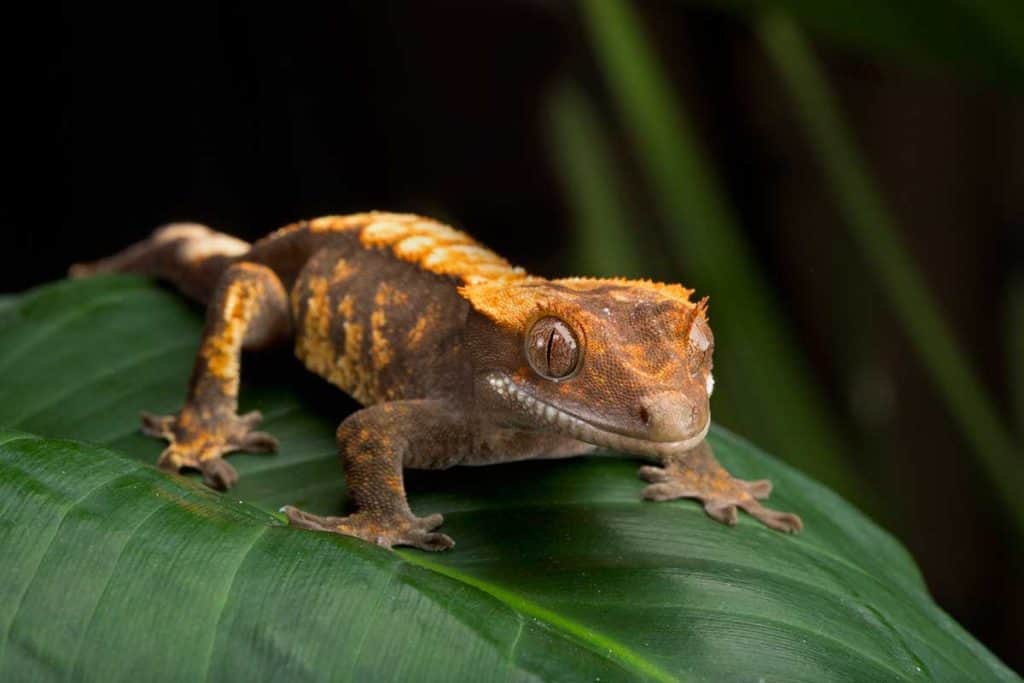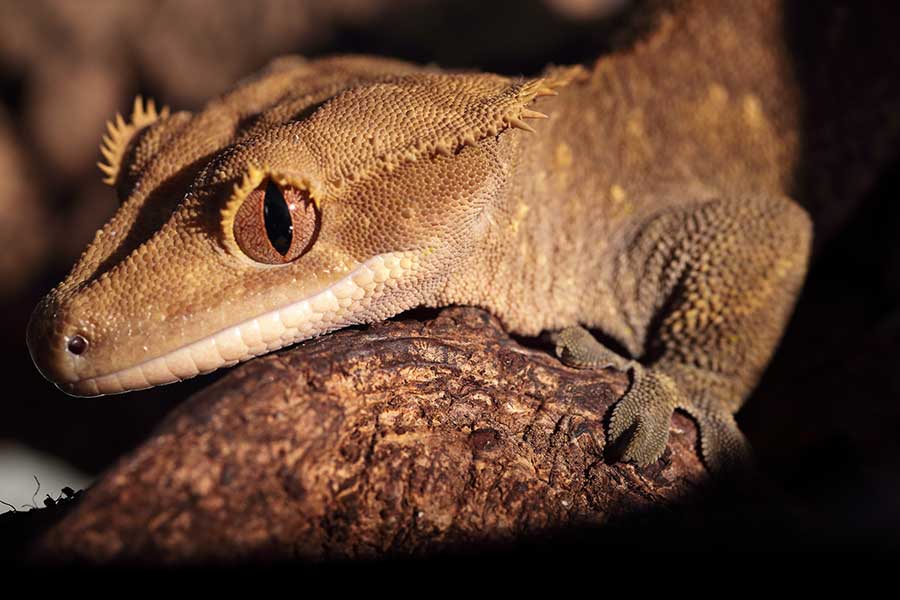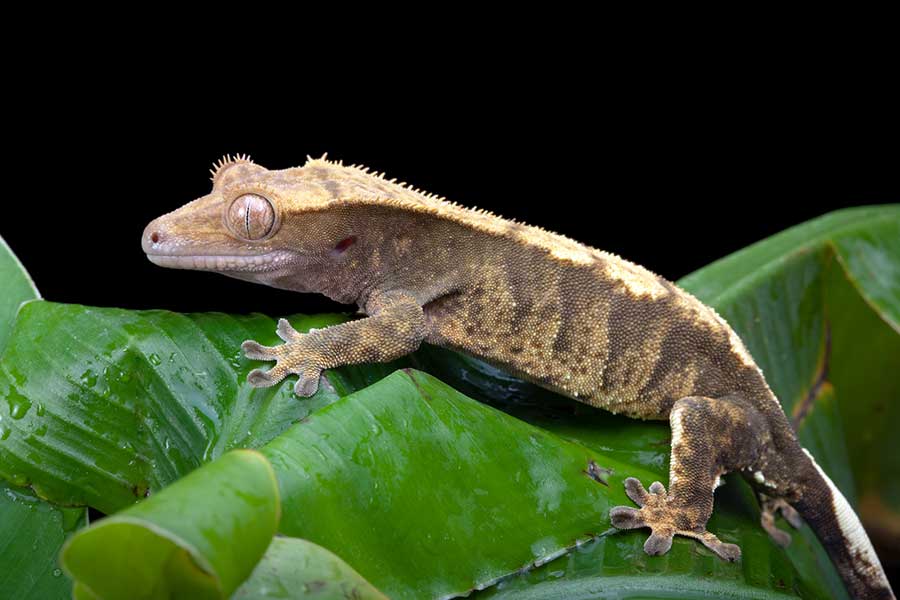Crested geckos are relatively easy to take care of, and they make great pets for beginner and experienced herpetologists alike. If you are planning to welcome a crested gecko into your home, you are probably wondering: how long do crested geckos live?
A properly cared for crested gecko can live for around 15 to 20 years in captivity! While small in size, cresties have a surprisingly long lifespan. Owning a crested gecko is a long-term commitment you need to be prepared for before bringing this tiny lizard home!
Although they are a long-lived species, many factors can affect a crested gecko’s lifespan. Factors such as breeding, diet, genetics, and husbandry can either negatively or positively affect your crested gecko’s lifespan and overall health.
Keep on reading to get the full scoop on all factors that affect the lifespan of crested geckos. I’ll also share some tips and tricks on how to increase your lizard’s life expectancy.
Crested Gecko Lifespan in Captivity
As mentioned above, crested geckos have an average life expectancy of 15 to 20 years. However, no one can tell for sure exactly how long these geckos live, since they were re-discovered in 1994. As a result, there is not a lot of data on how long cresties live either in the wild or captivity, and experts can only give rough estimates when it comes to their life expectancy.
The thing we do know, though, is that properly cared for pet geckos should live up to 15 years easily. In fact, those first crested geckos collected in 1994 were still alive in 2014, so some experts believe that these tiny lizards can actually live up to 30 years!
While there are a lot of unknown variables in this equation, one thing is for sure: crested geckos have long lifespans compared to many other reptile species commonly kept as pets, and keeping one of these reptiles is a long-term commitment. If you decide to welcome a crested gecko into your life, make sure you are financially stable and ready to take care of your scaly pet for, at least, the next two decades.
Factors that Affect the Crested Gecko’s Lifespan
There are several factors that influence how long crested geckos live in captivity. While you certainly have a say in what your gecko eats and what specific types of food you are feeding to your pet, there unfortunately isn’t a lot you can do about your crested gecko’s genetics. Factors that can shorten a crested gecko’s lifespan are:
Gender
Female crested geckos (and female reptiles in general) generally have shorter lifespans than males due to breeding and egg production. Not only does breeding a female crested gecko put strain on their nutritional stores, but it also poses a risk of emergency health problems. Lack of
Even if you don’t intend to breed your crestie, keep in mind that female geckos will occasionally lay (infertile) eggs even if they haven’t been anywhere near a male of their species.
Also, many reptile experts note that these issues are far more likely to happen in captivity than in the wild. It’s still not clear why, but improper care and fast growth are the most likely culprits.
If you don’t plan on breeding crested geckos, my advice to all reptile keepers looking for a cute pet is to choose a male juvenile or a sub-adult, as reproductive issues are less likely in male crested geckos.
Enclosure Size and Setup
Husbandry plays a major role when it comes to the health and life expectancy of crested geckos. Lack of proper care and, more specifically, an inadequate enclosure can lead to a wide range of health problems that will decrease your pet’s lifespan.
The biggest mistake new crested gecko owners make is getting a small enclosure. Just because crested geckos are small, this doesn’t mean they can live comfortably in a tiny enclosure. As a semi-arboreal lizard, the average crested gecko needs a 20-gallon tank, at a minimum, and plenty of decorations that create climbing and hiding surfaces to minimize stress and make the gecko feel comfortable and safe.
Temperature
Crested geckos are the happiest at a temperature slightly warmer than room temperature. Ideally, the daytime temperature inside the enclosure can range from 72 to 78 degrees Fahrenheit. At night, the temperature needs to be lower, ranging between 69 and 74 degrees Fahrenheit.
Temperatures above 85 degrees Fahrenheit can make your crested gecko stressed out and dehydrated and can even cause heatstroke. Alternatively, consistently low temperatures below 65 degrees Fahrenheit can result in loss of appetite and lethargy.
Humidity
Crested geckos need a high humidity level of around 70% to 80% to thrive and stay happy and healthy in captivity. You will have to mist your gecko’s tank two to three times a day using a squirt bottle or use an automatic misting system to maintain these high levels of humidity.
Keep in mind that very high levels of humidity can cause health problems like respiratory issues in the long run. If humidity is too low, on the other hand, it can lead to dehydration and cause shedding problems.
Diet
Diet is another major factor that can influence how long crested geckos live in captivity. The good news, though, is you can easily and inexpensively adjust your crested gecko’s diet to include all the essential nutrients they need to stay healthy. A complete and balanced diet can help keep your scaly pet healthy as long as possible and prevent the development of many serious health problems that are associated with nutritional deficiencies.
In the wild, crested geckos are omnivores, which means their diet in their natural habitat consists mostly of insects, fruit, and pollen. When it comes to feeding your pet gecko, you can choose a commercial food like Repashy or feed them a selection of feeder insects and soft, mashed-up fruit like bananas.
If you decide to feed your gecko insects and fruits, you’ll need to make sure they are getting enough
Health Problems
Like any other pet reptile, crested geckos can develop several health problems that can affect the length of their lifespan if not treated in time. Luckily for you, all of these health issues are easily preventable with proper care and diet. Some of these issues are:
- Metabolic bone disease
- Parasites
- Stuck shed (also known as dysecdysis)
- Bacterial and respiratory infections
If you notice your crested gecko is acting out of the ordinary or is experiencing loss of appetite, diarrhea, lethargy, dehydration, or any other sign of illness, take them to an exotics veterinarian as soon as possible. It’s also a good idea to take your crested gecko to yearly veterinary check ups even if they aren’t displaying any obvious symptoms to prevent any serious health problems from arising.
Tips for Extending a Crested Gecko’s Lifespan
Although crested geckos naturally have a long lifespan, there are some things you can do to ensure that your scaly friend reaches ripe old age! To extend your crested gecko’s life expectancy, you should:
- Get your pet from a reputable breeder or a pet store that can give you more information about your reptile’s lineage
- Find an experienced exotics vet that has experience treating reptiles before you bring a crested gecko home
- Feed your crested gecko a balanced and varied diet that consists of healthy fruits and gut-loaded and dusted feeder insects
- Since repeated breeding stresses female crested geckos, consider giving your female a rest period in between clutches so she can get all the necessary nutrients and recover properly
- Make sure your gecko has a large enough enclosure and that you are maintaining ideal temperature and humidity levels
FAQs About the Crested Gecko’s Lifespan
Do crested geckos die easily?
Crested geckos have long lifespans, but they can die easily if their basic care needs aren’t met.
For example, a crested gecko can die quickly from high temperatures if there is no thermal gradient inside their enclosure. Temperatures above ~85 degrees Fahrenheit will cause overheating and heatstroke. Alternatively, if temperatures are too low, your gecko won’t be able to digest their food or maintain their body temperature properly.
Crested geckos can also die easily if exposed to prolonged stress, infectious diseases, inappropriate humidity levels, open wounds, or dehydration.
Do crested geckos play dead?
Unlike some other reptiles, crested geckos never play dead. These small lizards aren’t up to doing tricks, and they have different defensive mechanisms to deter predators than playing dead. Crested geckos often sleep very still with their eyes closed, which makes them appear dead, especially to novice owners.
If your gecko isn’t moving for several hours and their eyes are open, they are most likely sleeping. If your crested gecko didn’t appear ill before that and you’ve been caring for it properly, there’s nothing you should worry about.
A Final Word
Now that you know how long crested geckos live, it’s up to you to decide whether or not you are ready to welcome one of these cute and curious reptiles into your home. These small and interesting lizards are relatively easy to keep and make great pets to both novice and experienced herpetologists.
However, don’t forget that crested geckos are a long-term commitment! Before bringing one home, make sure you’ll be able to keep and take care of your new scaly friend for the next decade or two!




